|
|
|
Sort Order |
|
|
|
Items / Page
|
|
|
|
|
|
|
| Srl | Item |
| 1 |
ID:
181686
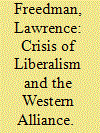

|
|
|
|
|
| Summary/Abstract |
Liberalism as the ideology of the Western alliance is in crisis. Having seen off Nazism and communism, it gained influence after the end of the Cold War, which produced optimism about security, human rights and global prosperity. Now liberalism, shaken by the financial crisis and the wars in Afghanistan and Iraq, is in retreat. Illiberal states, notably China and Russia, are reshaping the international system. Liberalism may not be able to continue to bind allies together, or enable them to cooperate effectively in a severe crisis. There are three counters to a gloomy prognosis, however. Firstly, heightened great-power competition has reinforced rather than undermined the alliance. Secondly, Russia and China have no substantial alliances, and are showing that authoritarian governments face serious problems of their own, including entrenched leaderships. Thirdly, liberalism remains better equipped to adapt to new circumstances.
|
|
|
|
|
|
|
|
|
|
|
|
|
|
|
|
| 2 |
ID:
145527
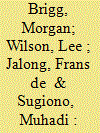

|
|
|
|
|
| Summary/Abstract |
Indonesia's normative leadership at the 1955 Asian-African Conference was grounded in anti-colonialism that became part of the ‘Bandung spirit’. However, the shape of Indonesia's recent leadership, following its remarkable democratisation, is harder to fathom. In response, this article suggests that Indonesia's regional and international engagements can be usefully understood through the lens of shifting domestic efforts to navigate unity with diversity, including as this is reflected in long-standing foreign policy commitments. Empirical reference points include the management of conflict in the Indonesian democratic transition, the place of civilian militias in Indonesian political life, and the Bali Democracy Forum. The case is made that Indonesia exhibits a remarkable embrace of diversity alongside substantial illiberality—a pattern that generates a flexible form of liberalism which presents difficulties, but also suggests particular opportunities for Indonesian leadership. Considering Indonesian navigation of unity with diversity enables a better understanding of the current and potential future shape of Indonesian leadership than analyses that rely on macro-level expectations of democratisation drawn from dominant liberal understandings of democracy and political order. This is in part because of the continuing salience of commitments to diversity, independence and cooperation that were articulated at Bandung in 1955.
|
|
|
|
|
|
|
|
|
|
|
|
|
|
|
|
| 3 |
ID:
141978
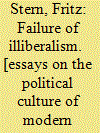

|
|
|
|
|
| Publication |
London, George Allen and unwin Ltd, 1972.
|
| Description |
xiiv+xii, 233p.hbk
|
| Standard Number |
004943019X
|
|
|
|
|
|
|
|
|
|
|
|
Copies: C:1/I:0,R:0,Q:0
Circulation
| Accession# | Call# | Current Location | Status | Policy | Location |
| 010562 | 943.08/STE 010562 | Main | On Shelf | General | |
|
|
|
|
| 4 |
ID:
154697
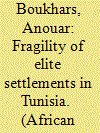

|
|
|
|
|
| Summary/Abstract |
Six years after the revolution that ousted Zine El-Abidine Ben Ali, Tunisia remains in flux. On the face of it, the country should be celebrated for transitioning from political ferment to consensual normalcy. Unfortunately, there is more to Tunisia’s transition to consensual politics than meets the eye. The country is still caught in a turbulent grey zone where strong authoritarian tendencies threaten to pull down the country’s tortuous march towards democratic stability. Some developments are particularly worrisome. The old authoritarian discourse emphasising stability and law and order has regained credence. The repressive habits of the police and security services are also back in full swing. The outlook for democratic stability darkens as the chasm between ordinary citizens and political elites expands. The lurch towards illiberalism and the failure of the successive postrevolutionary governments to make even the slightest dent in Tunisia’s dreadful unemployment rate and sharp regional economic inequalities are undermining faith in elite settlements and state institutions.
|
|
|
|
|
|
|
|
|
|
|
|
|
|
|
|
| 5 |
ID:
173339
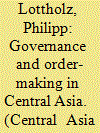

|
|
|
|
|
| Summary/Abstract |
This forum brings together five different angles on the question as to whether and how political regimes and forms of order-making can and should be researched through the concept of ‘illiberalism’. The discussion engages critically with this and associated concepts, such as ‘illiberal peace’ and ‘authoritarian conflict management’, which have been developed out of the Central Asian / Eurasian context and discussed in their wider global ramifications and, within the framing of ‘illiberal peace’, explored in various contexts in and beyond Central Asia. While further assessing the relevance and implications of this approach, this forum also attempts to think beyond ‘illiberalism’ by introducing and discussing the idea of ‘post-liberalism’. This way, the authors engage in an exchange that serves to probe both concepts and to determine their strengths and limitations when it comes to analysing and understanding politics and societal processes in Central Asia.
|
|
|
|
|
|
|
|
|
|
|
|
|
|
|
|
| 6 |
ID:
189710
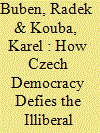

|
|
|
|
|
| Summary/Abstract |
Democratic backsliding in Hungary and Poland has raised questions as to whether Czech politics would follow a similar path. Focusing on transformations in the country’s political system over the past decade, this article argues that Czech democracy has proved resilient and defied the Central European illiberal trend. The starkly divergent outcomes are attributable to differences that set the Czech political tradition apart from those of Poland and Hungary. The liberal, secular, and pluralist tendencies present in the Czech democratic myth have made it more difficult to form an ideologically based movement built around a national-religious conservative narrative challenging liberal democratic values.
|
|
|
|
|
|
|
|
|
|
|
|
|
|
|
|
| 7 |
ID:
177849
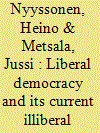

|
|
|
|
|
| Summary/Abstract |
This article focuses on the challenge of illiberalism to democracy, even though the nature of this contestation is ambiguous. The illiberal critique of liberal democracy is contextualised using conceptual history and two major ‘political credit ratings’, namely the Democracy Index and the Freedom in the World Report. Empirically we concentrate on Hungarian politics, which we consider to be an example of soft authoritarianism, drawing on two key speeches by Prime Minister Viktor Orbán: his launch of the idea of the ‘illiberal state’ in 2014 and his emphasis on ‘Christian democracy’ after the 2018 election campaign.
|
|
|
|
|
|
|
|
|
|
|
|
|
|
|
|
| 8 |
ID:
179284
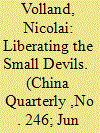

|
|
|
|
|
| Summary/Abstract |
Red Guard newspapers and pamphlets (wenge xiaobao) were a key source for early research on the Cultural Revolution, but they have rarely been analysed in their own right. How did these publications regard their status and function within the larger information ecosystem of the People's Republic, and what is their role in the history of the modern Chinese public sphere? This article focuses on a particular subset of Red Guard papers, namely those published by radical groups within the PRC's press and publication system. These newspapers critiqued the pre-Cultural Revolution press and reflected upon the possible futures of a new, revolutionary Chinese press. Short-lived as these experiments were, they constitute a test case to re-examine the functioning of the public in a decidedly “uncivil” polity. Ultimately, they point to the ambiguous potential of the public for both consensus and conflict, liberation and repression, which characterizes the press in 20th-century China.
|
|
|
|
|
|
|
|
|
|
|
|
|
|
|
|
| 9 |
ID:
186768
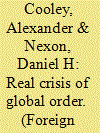

|
|
|
| 10 |
ID:
108314
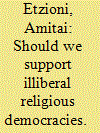

|
|
|
|
|
| Publication |
2011.
|
| Summary/Abstract |
The terms on which the US will agree to settle the conflict in Afghanistan reflect a much greater issue that the US faces in the Middle East: will it support only those who seek to establish democratic regimes that also respect individual, or ally itself with the often much more powerful groups that may be democratic, but are likely to foster regimes based on Shari'a law? At the very least, the West should urge all to respect the right to life, call on regimes to negotiate with protesters rather than machine-gunning them, and insist that protesters follow the Egyptian and Tunisian model of peaceful uprising. Beyond such liberal basics, it is best to let each nation work out its own regime. As a matter of policy, in order to support democratic groups and evolving democratic regimes in the Middle East, western governments had best be prepared to ally themselves with political forces whose liberal credentials, one must recognise, are evolving but not yet particularly high.
|
|
|
|
|
|
|
|
|
|
|
|
|
|
|
|
|
|
|
|
|